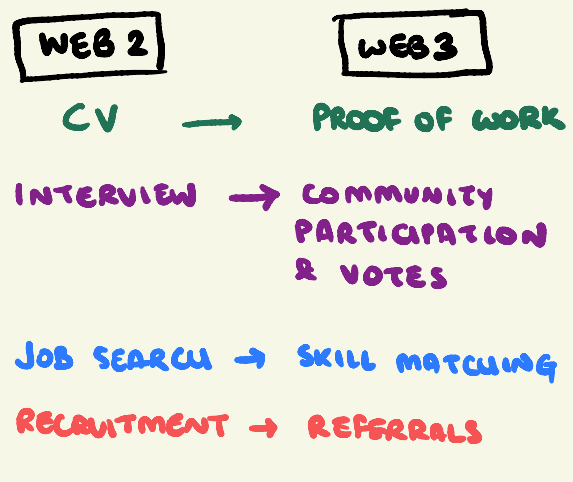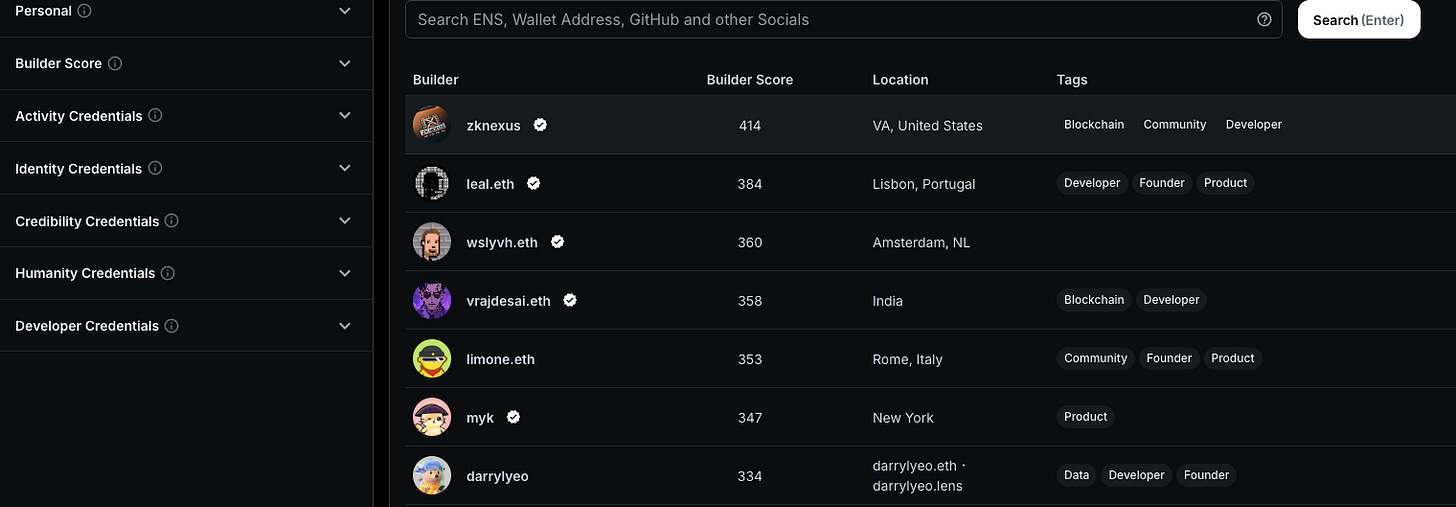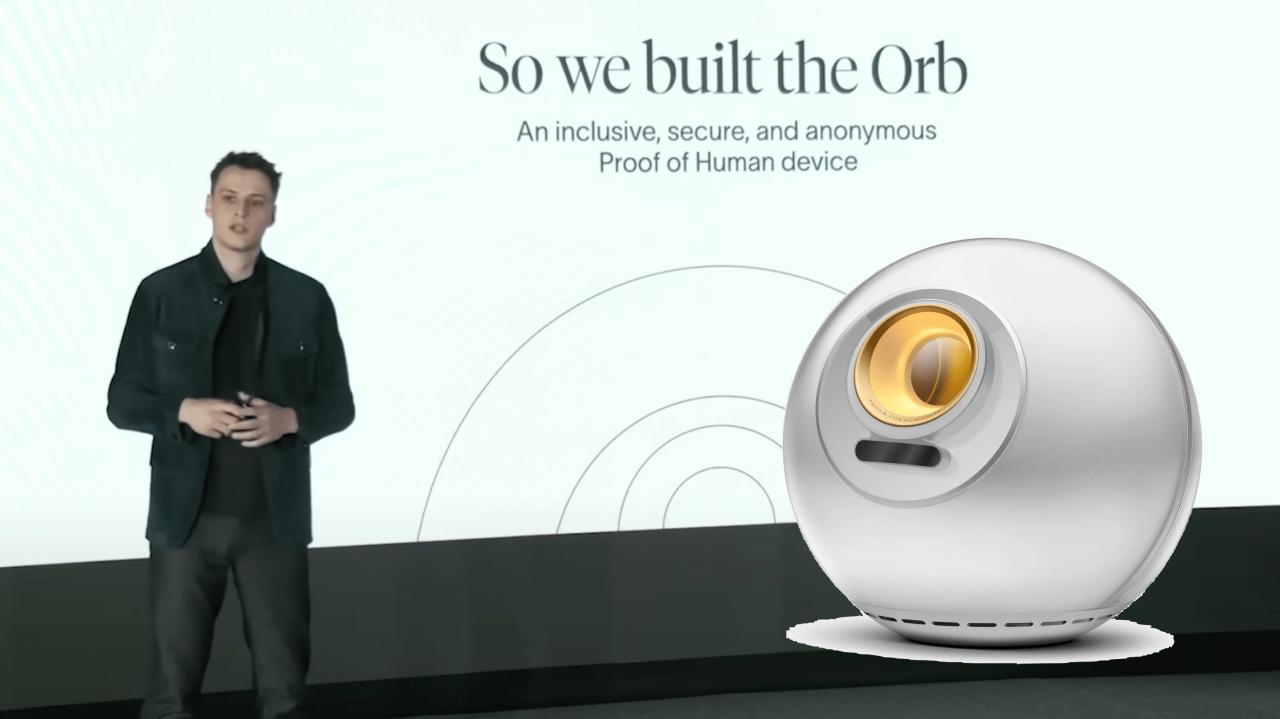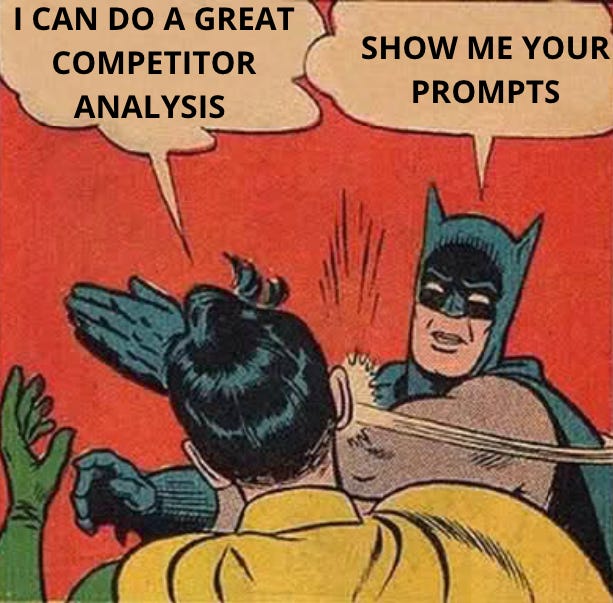Welcome to this week’s edition!
This week, we look beyond the traditional resume to understand:
How decentralized technologies are attempting to build verifiable digital reputations and an "Internet of Careers."
The fascinating (and sometimes unnerving) push towards quantifying professional value through "builder" or "proof of work" scores.
The practical reality that companies will increasingly need to test and see your actual AI workflow and output.
But first, please help us and take 60 seconds to fill this survey!
Let’s dive in!
The Broken Plumbing of Work and Early Attempts to Fix It
Let's start with a core problem: the infrastructure of work-matching.
How people find jobs and how companies find talent is at best, hugely inefficient - and arguably, completely broken.
Think about it; we currently rely on a piece of digital paper (the CV) that candidates fill in with their work experience and claims about achieved results.
You get the full spectrum: unnecessary information, blatant lies, and people who may have done amazing work and are unable to showcase it effectively.
Crucially, our career data is largely held by a handful of "Digital Landlords" (big platforms and companies). The data is often poor quality, siloed, and we rarely bother to measure the actual relationship between hiring metrics and successful outcomes in a role.
This fundamental inefficiency is why, back in 2018, a paper Andy co-authored with Don Tapscott and the Blockchain Research Institute first explored the potential impact of blockchain on work. You can download the full PDF paper here. The core premise was enabling digital work-matching platforms, managed by the very workers who use them, breaking away from the Digital Landlords. As Don Tapscott explains in this video: The main idea of Andy's paper is how blockchain is transforming the HR function and the market for skills, talent, and training.
Many early adopters in the Web3 space aimed to be the "crypto LinkedIn," trying to build this new infrastructure. However, looking back at the journey of those early attempts, it seems many lessons learned have not been fully understood or harnessed by the current Web3 generation. These include:
To truly disrupt an industry you first need to understand how it works – successful projects went deep into the industry to provide genuinely useful solutions. More successful examples include Zinc (from encrypted references to full background checks), Dock (from verifiable credential matching to general Web3 data solutions), and Chrono.tech (building their own stablecoin to streamline global work and payments when none existed).
Widely adopted Web3 solutions will ultimately rely on industry standards and collaboration. Velocity Foundation stands out as perhaps the only credible attempt at this collaborative, standards-based approach in the Work Technology industry. Without such collaboration, the most likely course for establishing standards will be, predictably, Big Tech.
Swallowing the "tech-bro hype cycle" by creating young, naive communities with big promises but failing to deliver damages credibility significantly.
Building the Plumbing: Digital Identity, Wallets, and Verifiable Credentials
The promise, therefore, lies in building this "basic plumbing" for work first.
This means enabling digital verification and allowing individuals to own their own digital career data via secure digital wallets. The whole concept of early blockchain efforts in this space (like Work 3, a play on ‘Web3’) was designed to digitalize this layer of trust, creating immutable, verifiable records of professional history and achievements, framed in the idea of an ‘Internet of Careers’.
Individuals use a career wallet on their device to collect digitally-signed proofs of their work, education, and skills from organizations (employers, schools, etc.). These organizations utilize credential agent software to issue and verify these digital credentials.
A blockchain network stores verification keys for these credentials, ensuring their trustworthiness without holding personal data. The system, in some models, is powered by a token (like Velocity Credits), used by organizations to pay for verification and rewarding credential issuers. The entire network is governed by The Foundation, a non-profit that sets the rules and guides the development of this decentralized "Internet of Careers."
Whilst I don’t have updated hard numbers on its current adoption, it's crucial to acknowledge that bringing a decentralized system like "The Internet of Careers" into widespread use faces significant hurdles. Mass adoption, particularly for infrastructure requiring network effects and buy-in from multiple organizations, is a considerable challenge. Despite this, I still see it as a potentially great infrastructure idea, representing a valuable step towards the broader ‘Datafication of Work’ – the inevitable trend of our professional lives becoming quantifiable data points. This shift towards workers owning their verifiable digital career wallets is also key to providing the better data that future systems, including AI, will rely on.
This move towards digital verification would enable a much more efficient work-matching system than the one we have today. It will inevitably create clear winners and losers.
Winners would likely be workers who can now find the best opportunities based on verified skills, and employers who can find truly qualified candidates more easily.
Losers would include the classic intermediaries in this process – notably, parts of the traditional recruitment industry. It was interesting to read recently in the UK Recruitment members magazine that there are industry initiatives already underway to create digital career wallets with launches planned for this Summer. It will be interesting to see the adoption and reaction from the industry.
Watch this space. (It's worth noting, of course, that the recruitment industry already relies more on Applicant Tracking Systems (ATS) using career data than just traditional paper CVs, so this shift is perhaps an evolution for them, albeit a potentially disruptive one).
Why Pure Objectification Won’t Work (Even with Good Plumbing)
Let’s circle back to evaluating capabilities. The messy reality of professional life is, thankfully, far more complex than management often wants it to be. It’s rarely easy to cleanly attribute a project’s success solely to one person (and that collaborative messiness is often a good thing!). More often than not, the people who get credit or move forward are the ones who can communicate their contributions first, or best – highlighting that value isn't purely a set of objective facts. This inherent complexity is precisely why attempts to reduce a person's professional worth to simple "objectification"—whether through verifiable credentials or single scores—will ultimately fall short.
Even with perfect "plumbing" providing verifiable facts and potentially network-derived scores (like a Builder Score from platforms like Talent Protocol), relying solely on these objective forms of proof doesn't cut it. Here are some key reasons why:
Verification of Fact vs. Demonstration of Applied Skill: A credential verified on a blockchain confirms a historical fact – you held a job, you got a degree, you finished a course. It's proof issued by an entity. But it offers almost no insight into how well you actually performed in that role, the specific nuanced problems you tackled, or—crucially for our discussion on future skills—how you practically think with and leverage AI tools in dynamic situations today. The future demands proof of applied skill and process, not just verified historical checkboxes.
The Attribution Problem Doesn't Disappear: As we rightly pointed out earlier, success in modern, complex work (especially with AI involved) is almost never the result of a single hero. While a verifiable credential might confirm you were on a project team at Company X, it still completely misses your specific individual contribution, your role in the collaboration, or the unique ways you used AI within that team effort. Storytelling, peer feedback, and other forms of demonstration are still absolutely necessary to explain individual impact, which significantly undermines the fantasy of a pure "trust via verification" model.
Limited Scope Misses Real Learning: Verifiable credential networks tend to stick to the easily formal: degrees, job titles, official licenses. But let's be real – much of the most valuable professional development, especially in rapidly changing areas like AI, happens in far less formal settings. Think personal side projects, contributions to open source, internal initiatives that never result in a fancy certificate. A system built only on formally issued credentials will inevitably miss a massive, crucial portion of a candidate's relevant experience and capability.
While this concept of dynamic professional reputation (like a Builder Score) tied into a “Token Economy” (where builders acquire $TALENT to reward the community) from platforms like Talent Protocol is a great idea, relying heavily on a single score, even one tied to network activity, risks being too limited. A number alone struggles to capture the full nuance, context, and unquantifiable aspects of a professional's value or potential.
These platforms also touch upon broader, more experimental ideas within the web3 space, such as the earlier (perhaps too extreme) concept of investing directly in individual 'builder tokens'. While that specific idea might have been ahead of its time or too extreme, these explorations into decentralized reputation and value are part of a broader movement within Web3 rethinking not just how individuals are evaluated, but how organizations themselves function and recognize contribution.
In that spirit, I'm still a big believer in new types of companies emerging that are structured more like DAOs (Decentralized Autonomous Organizations), where decision-making is distributed and even compensation can be handled by the crowd.
Speaking of proofs and identity, here’s a brief side-tour into something related: ‘Humanity Scoring’. You’re likely already aware (or maybe slightly creeped out) by the controversial Worldcoin project, spearheaded by Sam Altman.
Their whole thing revolves around scanning irises with a device they call the 'Orb' to create a unique digital identity – basically, trying to provide a verifiable ‘proof of human’ for the digital world. This feels exactly like a classic Silicon Valley move: spotting (or perhaps even helping create) a looming problem (distinguishing humans from bots online) and then turning around to sell their specific, centralized technology as the one and only necessary antidote.
The AI Layer: A New Challenge to Trust & Proof
So the question arises: even with better data plumbing and verifiable credentials, will they be enough?
Or will we move towards something else entirely, evaluating pure 'proof of work' in a new way? Answering this becomes particularly complex when we consider the very nature of trust and skill in the age of AI. Even with the acknowledged potential for exaggeration, the core assumption for the past century in hiring was human agency. However, in the age of AI, where these tools can significantly augment or even generate work, it will become more challenging to discern the true source of "skill" or "achievement." Is the impressive piece of writing the candidate's articulate thought process, or their ability to prompt a language model? Is the sophisticated data analysis a result of deep statistical understanding, or proficiency with an AI-powered tool that performed the heavy lifting?
While the widespread adoption of sweeping technological solutions for professional identity and trust – whether it’s the Orb scanning eyeballs or decentralized Builder Scores – remains a long-term prospect, companies are facing an immediate reality. Artificial intelligence is rapidly augmenting, and in some cases even generating, work. This capability presents a challenge for traditional evaluation: how do you truly assess a candidate's individual skill when AI can facilitate cheating or blur the lines of who did what?
In the meantime, we will see a rise in:
Cheating through AI - which we wrote about recently
Showing your AI - the idea of asking candidates to see how they use it
In this environment, we're already seeing the rise of a practical, in-the-meantime response: the "Show Me Your AI" approach. The idea shifts from simply verifying past roles to assessing how effectively candidates leverage AI tools. Given that prompting is arguably becoming a form of directing complex thought processes in this new era (a concept we’ve only just begun to explore), future hiring might involve letting candidates use AI during assessments, specifically testing their prompt quality, efficiency, workflow, and the tangible results they achieve.
How might this "Show Me Your AI" actually work in practice?
Testing AI capabilities will likely be implemented through more structured methods. This could involve screening tests via platforms like TestGorilla, which provide specific assessments for hiring processes. Alternatively, companies might use more complex (potentially in-person) business cases. In these scenarios, the technology would likely be provided, allowing evaluators to measure things like time taken, prompt quality, number of reworks, estimated cost of AI tokens used, and the overall success of the output, perhaps even through a simulated replica of an actual company project.
However, the trend towards evaluating AI interaction isn't always handled with structured tests or provided tech. During a recent event, an Italian tech journalist shared a concerning example from Saudi Arabia, where companies were reportedly asking candidates not just to show, but even bring their personal pre-trained GPTs, AI models, and prompts to the new job.
This specific instance goes even further than just testing proficiency; it dives headfirst into those really problematic areas of privacy and potential ‘IP’ nightmares. Asking for a candidate's entire AI toolbox and personal models is a level of intrusion I'm frankly not sure I'm ready to fully unpack right now. But it serves as a stark warning about how quickly some companies might escalate these demands and take things to extremes if they aren't guided or limited by clear regulations.
Final Thoughts
So the ultimate question is how will we find work, and how will our value be recognized, in this evolving future?
For Workers: The message is clear – keep building your brand, diversify your income streams, and cultivate your reputation within your network. Whatever scores or verifiable credentials emerge, your living in the future will heavily rely on these foundations. (You can find links to other careers articles we've done, here and here).
For Employers: You need to cast the net more widely to source talent and get much closer to emerging work tech industry solutions. This includes those that facilitate self-organised teams and better integrate the liquid workforce.
Given the fundamental shortcomings of pure objectification and relying solely on verifiable digital records, it becomes abundantly clear that human feedback, judgment, and nuanced evaluation are not some legacy annoyance to be automated away, but absolutely essential. While our "techno-fetishism" might push us to try and remove the human element entirely, the reality is that high-level strategy, critical decision-making, navigating ambiguity, and understanding complex interactions remain firmly in the human domain. This actually makes the evaluation of uniquely human capabilities even more important, and it's something that can only be done by other humans capable of processing the messy, unquantifiable data and subtle context that no technology can replicate.










I see a few problems here:
1. Innovators often fall in love with solutions while they should be falling in love with the problem. There is not a single person I know who would be interested in a CV with "verified" credentials. It's like asking people to go on television without makeup on. Instead, everyone wants to brush up their CVs a little bit and show their slightly polished best sides.
2. If candidates are required to offer verifiable information then the same should reply to recruiters. The extent to which people are lying about their credentials is easily matched by the extent to which recruiters are lying about corporate culture, compensation and career paths.
3. Finally, tech people love making incredibly complicated solutions for other tech people. Yes, I'm looking at the crypto and DAO world here. If they cannot explain to an average person in the street how it all works, there's no change at all of any mass market adoption.
But thanks for the writing. I'm incredibly interested in the topic. I just don't believe this is the direction to go.
Matteo, your analysis of the 'Proof of Work' concept in the evolving job landscape is enlightening.
As someone reinventing my career, understanding these paradigms is crucial.
Appreciate your forward-thinking perspectives.
— ILFAT ZIGANSHIN | ziganshin.com